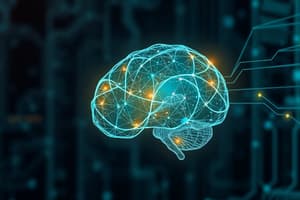Podcast
Questions and Answers
Máy học là một lĩnh vực của điều gì?
Máy học là một lĩnh vực của điều gì?
- Khoa học máy tính (correct)
- Toán học ứng dụng
- Kỹ thuật điện tử
- Công nghệ thông tin
Mục tiêu cuối cùng của trí tuệ nhân tạo (AI) là gì?
Mục tiêu cuối cùng của trí tuệ nhân tạo (AI) là gì?
- Phát triển phần mềm tự động hóa
- Tạo ra các máy móc thông minh có thể thực hiện các tác vụ không cần can thiệp của con người (correct)
- Tạo ra các máy tính hiệu quả cao
- Thay thế con người trong tất cả các công việc
Thuật toán máy học làm gì với dữ liệu lớn?
Thuật toán máy học làm gì với dữ liệu lớn?
- Mã hóa dữ liệu
- Lưu trữ dữ liệu
- Nhận dạng mẫu và đưa ra dự đoán hoặc quyết định (correct)
- Xử lý dữ liệu
Hai loại máy học chính là gì?
Hai loại máy học chính là gì?
Máy học được ứng dụng trong các lĩnh vực nào?
Máy học được ứng dụng trong các lĩnh vực nào?
Điều nào sau đây KHÔNG phải là một phần của máy học?
Điều nào sau đây KHÔNG phải là một phần của máy học?
Ứng dụng cụ thể của machine learning trong lĩnh vực nào?
Ứng dụng cụ thể của machine learning trong lĩnh vực nào?
Google Photos sử dụng công nghệ nào để phân loại ảnh dựa trên nội dung hình ảnh?
Google Photos sử dụng công nghệ nào để phân loại ảnh dựa trên nội dung hình ảnh?
Công nghệ machine learning có thể giúp Amazon thực hiện điều gì?
Công nghệ machine learning có thể giúp Amazon thực hiện điều gì?
Các thách thức mà machine learning đối diện bao gồm những vấn đề nào?
Các thách thức mà machine learning đối diện bao gồm những vấn đề nào?
Để giải quyết các vấn đề của machine learning, cần phải sử dụng phương pháp tiến bộ nào?
Để giải quyết các vấn đề của machine learning, cần phải sử dụng phương pháp tiến bộ nào?
Machine learning có tiềm năng gì để cách mạng hóa cuộc sống của chúng ta?
Machine learning có tiềm năng gì để cách mạng hóa cuộc sống của chúng ta?
Flashcards are hidden until you start studying
Study Notes
Introduction
Machine learning is a subfield of computer science that involves teaching computers to automatically improve their performance based on data. It falls under the broader category of artificial intelligence (AI), where the ultimate goal is to create intelligent machines that can perform tasks that typically require human intervention. By leveraging large datasets, machine learning algorithms aim to identify patterns and make predictions or decisions without explicit programming.
Basics of Machine Learning
Definition and Scope
Machine learning is concerned with training algorithms to recognize patterns and make decisions based on those patterns, enabling them to learn from experience and adapt to new situations over time. Its scope spans various domains, including speech and image recognition, natural language processing, and recommender systems.
Types
There are broadly two categories of machine learning: unsupervised and supervised learning. Unsupervised learning involves identifying patterns within data without predetermined classes or labels. On the other hand, supervised learning requires labeled data, meaning each input comes with its respective output, allowing the algorithm to learn the mapping between inputs and outputs.
Application of Machine Learning
Machine learning is applied in numerous fields, such as healthcare, finance, marketing, gaming, predictive modeling, and many others. Some specific applications include image recognition in healthcare, where machine learning algorithms help doctors detect diseases like diabetic retinopathy through fundus photography. Similarly, in the financial sector, machine learning models can analyze customer spending patterns to develop personalized credit card offers.
Real-World Examples
One example of machine learning application is Google Photos, which uses deep neural networks to categorize photos based on their visual content and creates searchable collections of similar pictures. Another instance is Amazon's movie recommendation system, which suggests movies or TV shows based on users' viewing history and preferences.
Challenges and Future Implications
Machine learning faces several challenges, such as bias in data collection, feature selection, model training, and interpretation. Addressing these issues requires a multifaceted approach involving methodological advancements, ethical considerations, and collaboration between experts from various fields.
As machine learning continues to evolve and become increasingly integrated into our daily lives, it raises important questions about privacy, security, accountability, and transparency. Understanding and addressing these concerns will be crucial for the responsible development and implementation of machine learning technologies in society.
In conclusion, machine learning represents a significant advancement in computer science that has the potential to revolutionize many aspects of our lives. By leveraging large datasets and sophisticated algorithms, machine learning enables computers to learn from experience and adapt to new situations, ultimately leading to improved performance in various domains. However, it also poses challenges related to ethics and privacy, which must be addressed to ensure that these technologies are developed and used responsibly.
Studying That Suits You
Use AI to generate personalized quizzes and flashcards to suit your learning preferences.




